#going to work!
Explore tagged Tumblr posts
Text
First off, spin this wheel.
You just landed on one of 200 fandoms that have been very popular somewhere on Tumblr over the years. Topics were chosen either from appearing on a @fandom end-of-year recap or from my own long (long, long) site memories before that.
also all of these fandoms are definitely things that really exist in the real world and none of them are Tumblr creations
#polls#tumblr polls#i just know at least one person is going to be like 'frozen? here??' and not even know about constable-frozen#also i tested the spinner link to make sure it worked and got saw loooooooooool
43K notes
·
View notes
Text
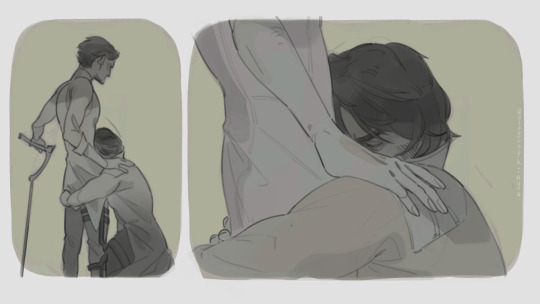
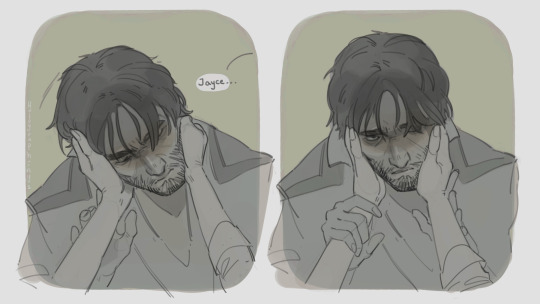
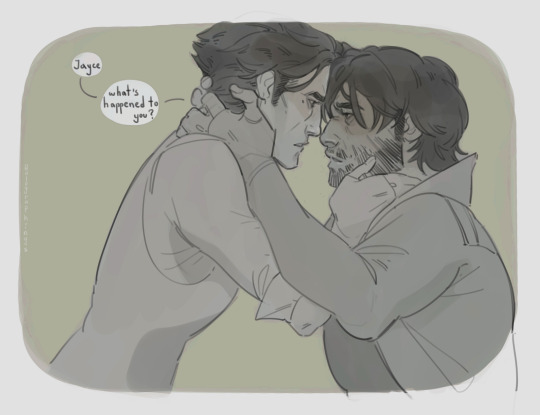
someone on twitter said Imagine what s2 jayce would give to talk to s1 viktor just one more time. and someone had a time travel alternate dimension fic ready to go. and i read it. and now my face is being eaten by 3750 feral dogs i think
#thisss wass going to be just one little sketch lord help me#the guys you put on this earth to finish their psych degrees are drawing pathetic men again#jayvik#arcane#viktor arcane#jayce talis#my art#fanart#i have uni and work and also therapy to do but i got sick this week so i think i read like. over 30 fics yesterday like i was struck#by some affliction legitimately#please talk with me about them. this is a cry for help#i drew all these while listening to circa survive on repeat do you understand what that does to a man
36K notes
·
View notes
Text

you understand?
#Inspired by getting jumspcared by the poppiest song on a character playlist and going yeah this doesn’t NOT work. But like……#misc :0]
28K notes
·
View notes
Text

#comic#first comic on da new pc#and now i go lay down#if you’re wondering why I am so Tired: I have PCOS which leads to chronic fatigue AND I work full time where I have to mask 8 hours a day#and talk to customers on the phone and solve their problems#I’m pretty fucking sleepy most of the time
23K notes
·
View notes
Text
My baby daughter got her adorable puffin-print dress absolutely CAKED in mud crawling around the yard and my first thought was "oh no her beautiful dress"
And my second thought was "oh huh it really WOULD be easy to unconsciously steer her away from playing in the dirt. Unlike my son, whose outfits are usually some kind of solid dark easily washed pants plus a shirt that doesn't trail in the dirt like a dress does."
Anyway something something gender roles start getting shoved on kids from literal birth, but with a little time to think about things, YOU TOO can let your children of any gender absolutely destroy their clothes in the dirt pit they're digging in your garden
#all clothes provided through hand me downs and grandparents#we asked for non strongly gendered or branded things and that mostly worked for firstborn boy#but baby girl has gotten nothing but the cutest little dresses#that I am absolutely not going to stress if she destroys because it's not like they'll last until next summer anyway#at which point she'll be big enough for her brother's dirt-compatible pants#now if we can get her to stop EATING the dirt that would be GRAND#her pronouns are om/nom#literal definition of a baby
43K notes
·
View notes
Text
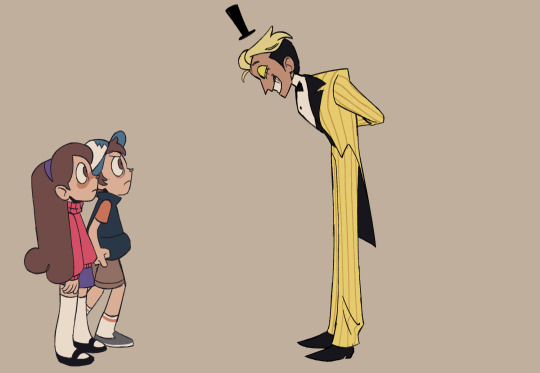
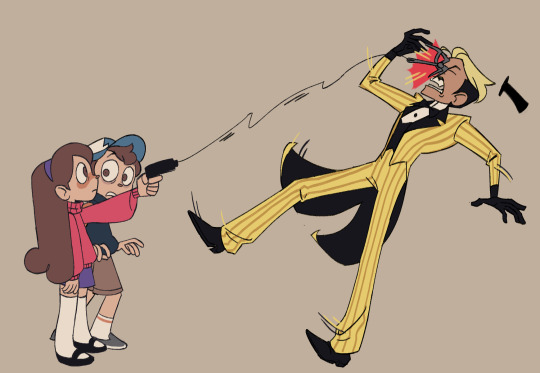
also deciding to make stuff that 12 year old me would have wanted to draw
#i dont even care im never escaping the sexyman enjoyer allegations#cringe is dead let me draw the sexyman this is literally tumblr#gravity falls#bill cipher#dipper pines#mabel pines#i have more but i gotta go back to work so maybe ill post it tmr who knows
43K notes
·
View notes
Text
shaking my head while playing neko atsume so people know that I don’t support outdoor cats
#I heard they made neko atsume 2 and I couldn’t decide which I wanted so I downloaded both#the nice thing is that 1 comes with a watch app so I can easily check if there are new cats without pulling out my phone#great for when I go to pee at work and realize I left my phone but still wanna procrastinate#but 2 you can visit other people’s yards???
19K notes
·
View notes
Text
what they dont tell you about adulthood is that it’s startlingly easy to go long periods of time without having any fun at all not even a little bit. btw this makes ur brain try to kill you with knives and hammers.
126K notes
·
View notes
Text
Planet's Fucked: What Can You Do To Help? (Long Post)
Since nobody is talking about the existential threat to the climate and the environment a second Trump term/Republican government control will cause, which to me supersedes literally every other issue, I wanted to just say my two cents, and some things you can do to help. I am a conservation biologist, whose field was hit substantially by the first Trump presidency. I study wild bees, birds, and plants.
In case anyone forgot what he did last time, he gagged scientists' ability to talk about climate change, he tried zeroing budgets for agencies like the NOAA, he attempted to gut protections in the Endangered Species Act (mainly by redefining 'take' in a way that would allow corporations to destroy habitat of imperiled species with no ramifications), he tried to do the same for the Migratory Bird Treaty Act (the law that offers official protection for native non-game birds), he sought to expand oil and coal extraction from federal protected lands, he shrunk the size of multiple national preserves, HE PULLED US OUT OF THE PARIS CLIMATE AGREEMENT, and more.
We are at a crucial tipping point in being able to slow the pace of climate change, where we decide what emissions scenario we will operate at, with existential consequences for both the environment and people. We are also in the middle of the Sixth Mass Extinction, with the rate of species extinctions far surpassing background rates due completely to human actions. What we do now will determine the fate of the environment for hundreds or thousands of years - from our ability to grow key food crops (goodbye corn belt! I hated you anyway but), to the pressure on coastal communities that will face the brunt of sea level rise and intensifying extreme weather events, to desertification, ocean acidification, wildfires, melting permafrost (yay, outbreaks of deadly frozen viruses!), and a breaking down of ecosystems and ecosystem services due to continued habitat loss and species declines, especially insect declines. The fact that the environment is clearly a low priority issue despite the very real existential threat to so many people, is beyond my ability to understand. I do partly blame the public education system for offering no mandatory environmental science curriculum or any at all in most places. What it means is that it will take the support of everyone who does care to make any amount of difference in this steeply uphill battle.
There are not enough environmental scientists to solve these issues, not if public support is not on our side and the majority of the general public is either uninformed or actively hostile towards climate science (or any conservation science).
So what can you, my fellow Americans, do to help mitigate and minimize the inevitable damage that lay ahead?
I'm not going to tell you to recycle more or take shorter showers. I'll be honest, that stuff is a drop in the bucket. What does matter on the individual level is restoring and protecting habitat, reducing threats to at-risk species, reducing pesticide use, improving agricultural practices, and pushing for policy changes. Restoring CONNECTIVITY to our landscape - corridors of contiguous habitat - will make all the difference for wildlife to be able to survive a changing climate and continued human population expansion.
**Caveat that I work in the northeast with pollinators and birds so I cannot provide specific organizations for some topics, including climate change focused NGOs. Scientists on tumblr who specialize in other fields, please add your own recommended resources. **
We need two things: FUNDING and MANPOWER.
You may surprised to find that an insane amount of conservation work is carried out by volunteers. We don't ever have the funds to pay most of the people who want to help. If you really really care, consider going into a conservation-related field as a career. It's rewarding, passionate work.
At the national level, please support:
The Nature Conservancy
Xerces Society for Invertebrate Conservation
Cornell Lab of Ornithology (including eBird)
National Audubon Society
Federal Duck Stamps (you don't need to be a hunter to buy one!)
These first four work to acquire and restore critical habitat, change environmental policy, and educate the public. There is almost certainly a Nature Conservancy-owned property within driving distance of you. Xerces plays a very large role in pollinator conservation, including sustainable agriculture, native bee monitoring programs, and the Bee City/Bee Campus USA programs. The Lab of O is one of the world's leaders in bird research and conservation. Audubon focuses on bird conservation. You can get annual memberships to these organizations and receive cool swag and/or a subscription to their publications which are well worth it. You can also volunteer your time; we need thousands of volunteers to do everything from conducting wildlife surveys, invasive species removal, providing outreach programming, managing habitat/clearing trails, planting trees, you name it. Federal Duck Stamps are the major revenue for wetland conservation; hunters need to buy them to hunt waterfowl but anyone can get them to collect!
THERE ARE DEFINITELY MORE, but these are a start.
Additionally, any federal or local organizations that seek to provide support and relief to those affected by hurricanes, sea level rise, any form of coastal climate change...
At the regional level:
These are a list of topics that affect major regions of the United States. Since I do not work in most of these areas I don't feel confident recommending specific organizations, but please seek resources relating to these as they are likely major conservation issues near you.
PRAIRIE CONSERVATION & PRAIRIE POTHOLE WETLANDS
DRYING OF THE COLORADO RIVER (good overview video linked)
PROTECTION OF ESTUARIES AND SALTMARSH, ESPECIALLY IN THE DELAWARE BAY AND LONG ISLAND (and mangroves further south, everglades etc; this includes restoring LIVING SHORELINES instead of concrete storm walls; also check out the likely-soon extinction of saltmarsh sparrows)
UNDAMMING MAJOR RIVERS (not just the Colorado; restoring salmon runs, restoring historic floodplains)
NATIVE POLLINATOR DECLINES (NOT honeybees. for fuck's sake. honeybees are non-native domesticated animals. don't you DARE get honeybee hives to 'save the bees')
WILDLIFE ALONG THE SOUTHERN BORDER (support the Mission Butterfly Center!)
INVASIVE PLANT AND ANIMAL SPECIES (this is everywhere but the specifics will differ regionally, dear lord please help Hawaii)
LOSS OF WETLANDS NATIONWIDE (some states have lost over 90% of their wetlands, I'm looking at you California, Ohio, Illinois)
INDUSTRIAL AGRICULTURE, esp in the CORN BELT and CALIFORNIA - this is an issue much bigger than each of us, but we can work incrementally to promote sustainable practices and create habitat in farmland-dominated areas. Support small, local farms, especially those that use soil regenerative practices, no-till agriculture, no pesticides/Integrated Pest Management/no neonicotinoids/at least non-persistent pesticides. We need more farmers enrolling in NRCS programs to put farmland in temporary or permanent wetland easements, or to rent the land for a 30-year solar farm cycle. We've lost over 99% of our prairies to corn and soybeans. Let's not make it 100%.
INDIGENOUS LAND-BACK EFFORTS/INDIGENOUS LAND MANAGEMENT/TEK (adding this because there have been increasing efforts not just for reparations but to also allow indigenous communities to steward and manage lands either fully independently or alongside western science, and it would have great benefits for both people and the land; I know others on here could speak much more on this. Please platform indigenous voices)
HARMFUL ALGAL BLOOMS (get your neighbors to stop dumping fertilizers on their lawn next to lakes, reduce agricultural runoff)
OCEAN PLASTIC (it's not straws, it's mostly commercial fishing line/trawling equipment and microplastics)
A lot of these are interconnected. And of course not a complete list.
At the state and local level:
You probably have the most power to make change at the local level!
Support or volunteer at your local nature centers, local/state land conservancy non-profits (find out who owns&manages the preserves you like to hike at!), state fish & game dept/non-game program, local Audubon chapters (they do a LOT). Participate in a Christmas Bird Count!
Join local garden clubs, which install and maintain town plantings - encourage them to use NATIVE plants. Join a community garden!
Get your college campus or city/town certified in the Bee Campus USA/Bee City USA programs from the Xerces Society
Check out your state's official plant nursery, forest society, natural heritage program, anything that you could become a member of, get plants from, or volunteer at.
Volunteer to be part of your town's conservation commission, which makes decisions about land management and funding
Attend classes or volunteer with your land grant university's cooperative extension (including master gardener programs)
Literally any volunteer effort aimed at improving the local environment, whether that's picking up litter, pulling invasive plants, installing a local garden, planting trees in a city park, ANYTHING. make a positive change in your own sphere. learn the local issues affecting your nearby ecosystems. I guarantee some lake or river nearby is polluted
MAKE HABITAT IN YOUR COMMUNITY. Biggest thing you can do. Use plants native to your area in your yard or garden. Ditch your lawn. Don't use pesticides (including mosquito spraying, tick spraying, Roundup, etc). Don't use fertilizers that will run off into drinking water. Leave the leaves in your yard. Get your school/college to plant native gardens. Plant native trees (most trees planted in yards are not native). Remove invasive plants in your yard.
On this last point, HERE ARE EASY ONLINE RESOURCES TO FIND NATIVE PLANTS and LEARN ABOUT NATIVE GARDENING:
Xerces Society Pollinator Conservation Resource Center
Pollinator Pathway
Audubon Native Plant Finder
Homegrown National Park (and Doug Tallamy's other books)
National Wildlife Federation Native Plant Finder (clunky but somewhat helpful)
Heather Holm (for prairie/midwest/northeast)
MonarchGard w/ Benjamin Vogt (for prairie/midwest)
Native Plant Trust (northeast & mid-atlantic)
Grow Native Massachusetts (northeast)
Habitat Gardening in Central New York (northeast)
There are many more - I'm not familiar with resources for western states. Print books are your biggest friend. Happy to provide a list of those.
Lastly, you can help scientists monitor species using citizen science. Contribute to iNaturalist, eBird, Bumblebee Watch, or any number of more geographically or taxonomically targeted programs (for instance, our state has a butterfly census carried out by citizen volunteers).
In short? Get curious, get educated, get involved. Notice your local nature, find out how it's threatened, and find out who's working to protect it that you can help with. The health of the planet, including our resilience to climate change, is determined by small local efforts to maintain and restore habitat. That is how we survive this. When government funding won't come, when we're beat back at every turn trying to get policy changed, it comes down to each individual person creating a safe refuge for nature.
Thanks for reading this far. Please feel free to add your own credible resources and organizations.
#us election#climate change#united states election#resources#native plants#this took 3 hours to write so maybe don't let it flop? i know i write long posts. i know i follow scientists on here#that study birds and corals and other creatures#i realize i did not link sources/resources for everything. i encourage those more qualified to add things on. i need to go to work
18K notes
·
View notes
Text

#going to work!#another day of amputations and lung cancer in canadas finest neighbourhood#harry dubois portrait photo here
0 notes
Text
People against piracy fail to realize that no, I can’t just ‘buy it.’ They stopped making DVDs and Blu-Rays. They’re barely offering digital copies for download. I am not spending money I could use for food or bills to pay for a subscription service just so I can always have access to a beloved piece of media. Especially not when the service will remove media on a whim without concern for how the loss of access to that piece will make its artistic conservation nigh impossible.
For example, I recently learned that Disney+ had an original film called Crater. It’s scifi, family friendly, and seems cool - I would love to buy it as a holiday gift for my little brother! But: it’s exclusive to D+ and THEY REMOVED IT LITERALLY MONTHS AFTER ITS RELEASE.
The ONLY way I can directly access this film is through piracy. The ONLY available ‘copies’ of this film are hosted on piracy websites. Disney will NEVER release it in theaters, or as something to buy, and it may NEVER return to the streaming service. It will be LOST because we aren’t allowed to purchase it for personal viewing. If I can’t pay to own it, I won’t pay for the privilege of losing it when corporate decides to put it in a vault.
So yes, I’m going to pirate and support piracy.
Edit: if you are able, use $5 you would otherwise use for a streaming subscription to donate to a GazaFunds campaign.
#edit: go to https://gazafunds.org/ and donate $5 you would otherwise spend on streaming services on a campaign!#ra speaks#piracy#media piracy#pirate to make hondo ohnaka proud#obligatory ‘don’t fucking pirate small authors/artists works wtf dude’ statement.#anyone who’s seen my media bitching before knows I’m a hype man for indie films this ain’t about them#this is about corporate streaming services killing physical media bc sales numbers are less impressive than number of streams#edit: USAmericans stop telling me to buy DVDs and blurays at Walmart. think outside your borders for a hot sec. fun thought exercise.#your experiences are not universal#edit: WHO GOT THIS TO 100k. I JUST WANT TO TALK (this post is my second to hit 100k woahg.)#in other news: fix your fucking posture. drink some fucking water. and go the fuck to bed if it’s late bc it’s for me rn. peace and light.
135K notes
·
View notes
Text

endless night
#animal art#animal comic#penguin art#comic art#artists on tumblr#just a comic about emperor penguins#(they are emperor penguins but yellow didn’t go with the colour scheme loool)#(i tried to make it work just trust me lol)#i keep forgetting to upload here woops#sometimes i don’t wanna draw anthros#i’ve been wanting to experiment again#i have a couple pieces planned#but i also wanna do more horror#rlyyyyy hard to decide lmaoooo
54K notes
·
View notes
Text
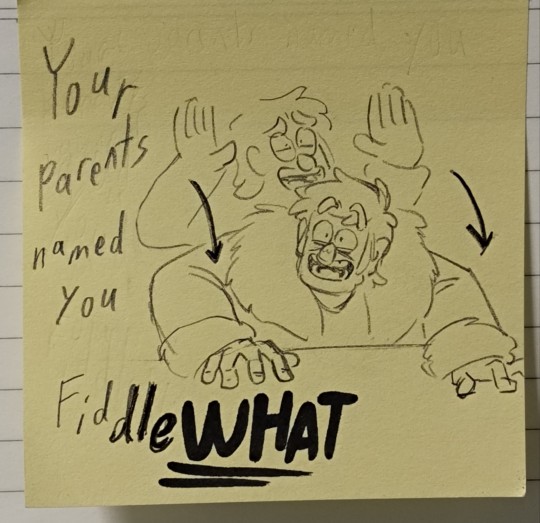
It's 4am and I can't get this out of my head
#my post#my art#gravity falls#this could absolutely be fiddlestan. god it would be so funny#either way he's just lost his brother and is working the biggest scam of his life#and also taking a false name#as of this moment in time any other mention of Ford's name is going to send him into a fit of hysterics#stanley pines
11K notes
·
View notes
Text

Grief
ref photo by @jawsstone
#artists on tumblr#my friend let me use a really gorgeous photo they took#it made my brain go brrr#and i had to draw this#i usually take my own reference pics so it was cool to work from someone else's#enjoyed drawing this a lot#despite the subject matter#i saw a pretty scene of a narrow alley#with white stairs stained black from people walking on them#and somehow it took my brain here#grief visits every house
28K notes
·
View notes
Text

turbo granny
#hey long time no see! just started dandadan recently...its epic#dandadan#fanart#turbogranny#yvo draws#made this while working on comms and wasnt going to polish it but ended up rly liking it hehe
16K notes
·
View notes
Text
if you're interested in experiencing the most undignified way of having a bad time ever devised, then look no further than having a body
18K notes
·
View notes